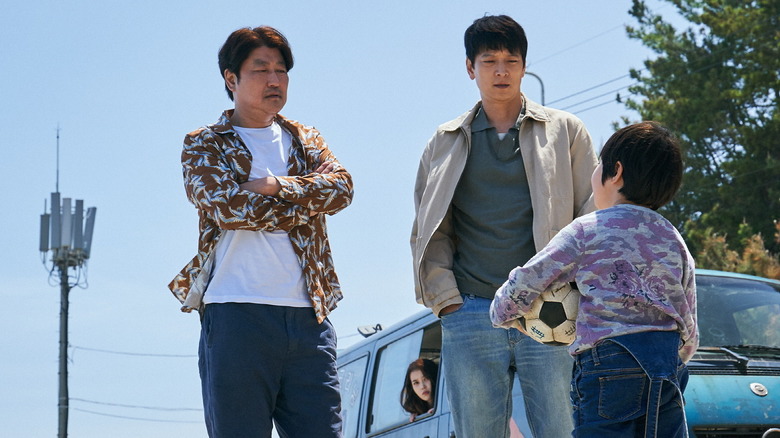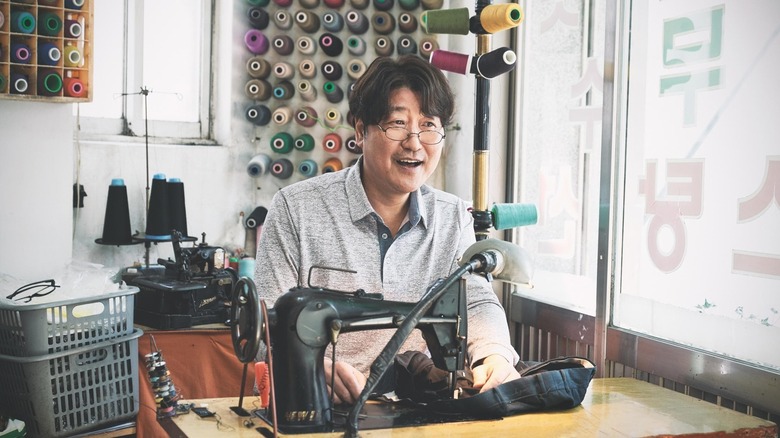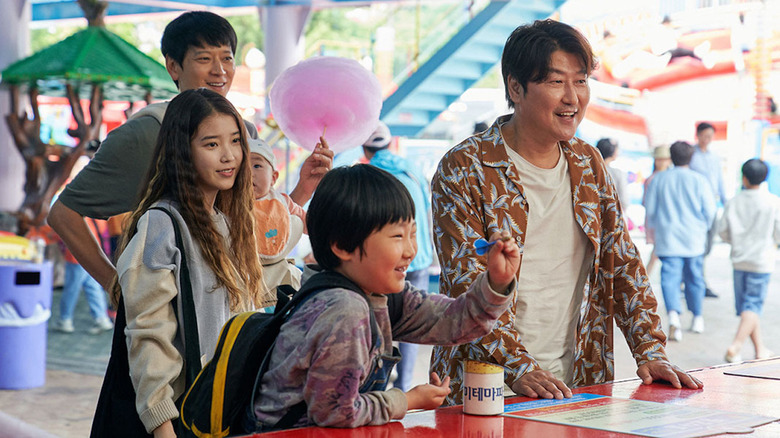Broker Director Hirokazu Kore-Eda On Competing Philosophies And Chosen Families [Exclusive Interview]
Director Hirokazu Kore-eda earned an Oscar nomination with his 2018 family drama, "Shoplifters." His film pulled heartstrings organically, subtly, and unforgettably. The director's humor resonated with audiences around the world, and his earlier films also manage to feel both meditative and packed to the brim at once. So when I heard Kore-eda was making a road film with some incredible South Korean actors, including Song Kang-Ho of "Parasite" and Bae Doona of "The Host," I was overjoyed.
"Broker" stars the K-pop idol IU (real name: Lee Ji-eun) as a young woman who leaves her baby in front of a baby box. The baby is then abducted by two men, portrayed by Song Kang-ho and Dong-won Gang, who plan to illegally facilitate an adoption. The mother comes back for her child and encounters the baby brokers, and, wanting to make sure her baby has a better life than she did, she decides to help them on their quest to find a worthy set of adoptive parents. As they travel through South Korea in their dry-cleaning van, they are tracked by two policewomen, played by Bae Doona and Joo-young Lee, who want to catch them in the act and charge them with human trafficking.
The film has lots of comedic and warm moments, but it also handles some incredibly difficult and even controversial topics. I was honored to have the opportunity to speak with Kore-eda about his influences, his process, and his artistic intent. I asked the director questions in English, which were translated into Japanese by his talented interpreter. He responded in Japanese, and his answers were translated into English for us.
'The film really explored the idea of those chosen families'
Mr. Kore-eda, I'm a big fan of the cat-and-mouse structure in "Broker," and the way that you balance levity and danger reminded me a lot of some of my favorite films, like "Dog Day Afternoon" and "Branded to Kill." Are there any similar movies with a sympathetic or even light-hearted take on criminals that inspired you in making "Broker?"
Yes, Shae, it's actually one of the favorite ... Kore-eda really likes "Dog Day Afternoon" as well. It might not be upbeat so much. But yes, he likes that film very much. "They Live By Night" by Nicholas Ray is also his favorite as well. But the film that he re-watched to create "Broker" was "3 Godfathers" by John Ford.
I've also noticed that in each of your films about family life, from "Still Walking" to "Like Father, Like Son" to "Shoplifters" to "Broker," the families become progressively more untraditional and ethically questionable. But at the same time, "Broker" presents a very positive philosophy about life and chosen family. Do you feel like your outlook has become more cynical over the years or more optimistic?
I wonder ... I do question whether my own perception is being reflected into the films that I make. So I only started to think about the possibility of family after "Like Father, Like Son," consciously. And really, in terms of familial relationships, in Japan, blood ties tend to be very important. It tends to be what binds family, in most cases. But I think the film really explored the idea of those chosen families, as you phrased it, people who have chosen to be together without blood ties.
I guess, in some ways, I am suggesting to society that it could be — the family doesn't have to be somebody who is bound by blood only, and it could be in other forms as well. And perhaps it's something that I am conscious of when I create films. So if you ask me the question of whether I am cynical or positive, perhaps I am more trying to view things in a positive manner. And that's not something that's consciously done, but that came to my mind after your question.
'I wanted to make sure that I was covering different perspectives'
I understand that you were casting for this film during the height of the pandemic. Did working over Zoom change how you mentally approached the casting process?
Yes, but the three characters, Song Kang-ho, Dong-won Gang, and Bae Doona, all three of them were already ... I was speaking to them before the pandemic, and I had wrote the short plot bearing in mind of those three actors. But the other two actors, Lee Ji-eun and Lee Joo-young, who are acting the detectives, yes, I cast them during the pandemic. But I came across their work on one of the streaming dramas, and I had made contact with them. And the first meeting was over Zoom. But yeah, that was the process. So it wasn't entirely over Zoom. The struggle over casting over Zoom was really the baby. It was really a gamble to choose a month-old baby over Zoom, but it was worth it. We have won the gamble, but it was definitely a challenge.
The film presents a lot of interesting arguments about abortion versus adoption. What do you want audiences to glean from the film about these issues?
There was certain reactions actually at Cannes, when this film was first previewed — released. A few people have asked me whether I am against abortion in its entirety, and some articles came out saying this was a message about — that the film included an anti-abortion message, but that's not the case at all. I didn't really create the film with that kind of mindset. It was more about how people in the society would react to a life that has been born and how the society would try and protect the baby. And it's really more about...
I really wanted to depict different mindsets and also different perceptions surrounding that issue. For example, the baby boxes and baby hatches, which exist in Japan and Korea, there are varying views, two very different standpoints. One is really, the priority is to protect the life of the baby, so we should be really supporting the existence of these baby boxes and hatches. The other side would argue that, no, you would be encouraging by making it easy for the mothers to abandon the babies, and that can only be the negative thing. So there's those two opposing views, and there's a varying spectrum of those views on it. I wanted to make sure that I was covering different perspectives from different viewpoints within this film. And ultimately, I want the audience to really see those different perceptions, and question where they sit within these issues, and to make them really think about their standpoint as well.
Song Kang-ho and Gang Dong-won have said in several interviews that they really respected you and enjoyed working with you. And I thought that they really shone under your direction. Do you think you would work with either or both of them again in the future?
So there are no concrete plans of shooting any works with either of them at the moment, but it was a great experience working with those actors, and it was really invaluable to create works with such talents. Now I'm back in Japan and shooting works in Japan. In the future, it would be great to work with both of them, but also not limited to them, actually. All the other talents from Asia, and also possibly, going away from Asia as well, non-Japanese staff members, cast members, to really collaborate, that would be exciting, because it was a great experience to shoot this film.
"Broker" is now in theaters in New York and arrives in Los Angeles on December 28, 2022.


